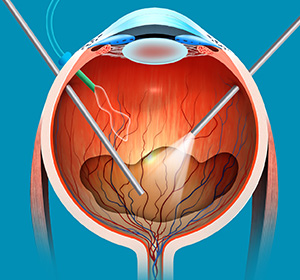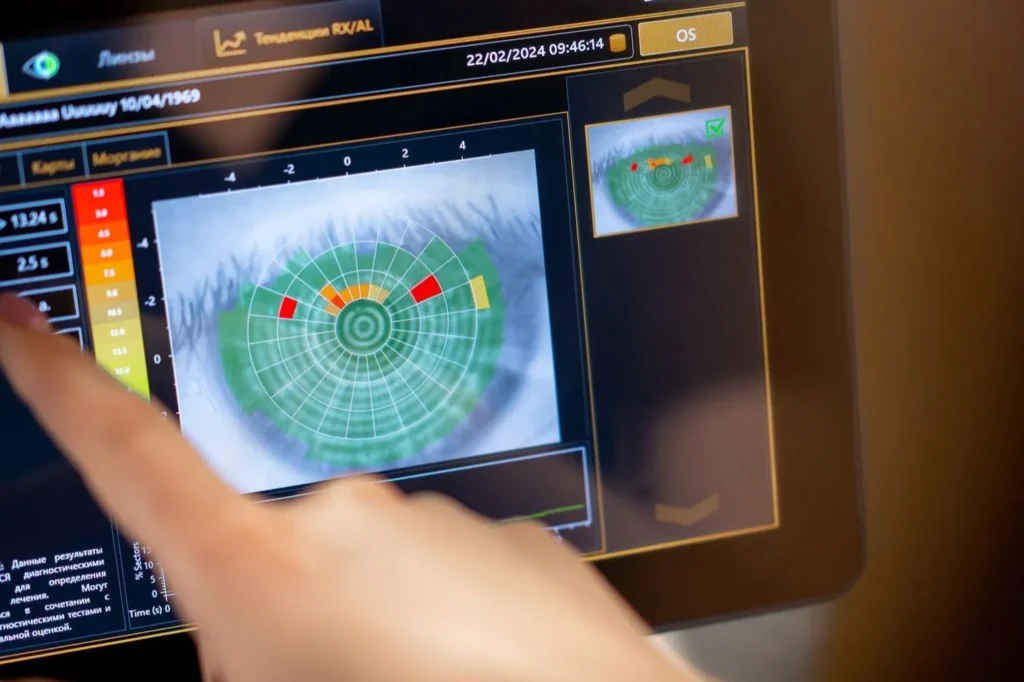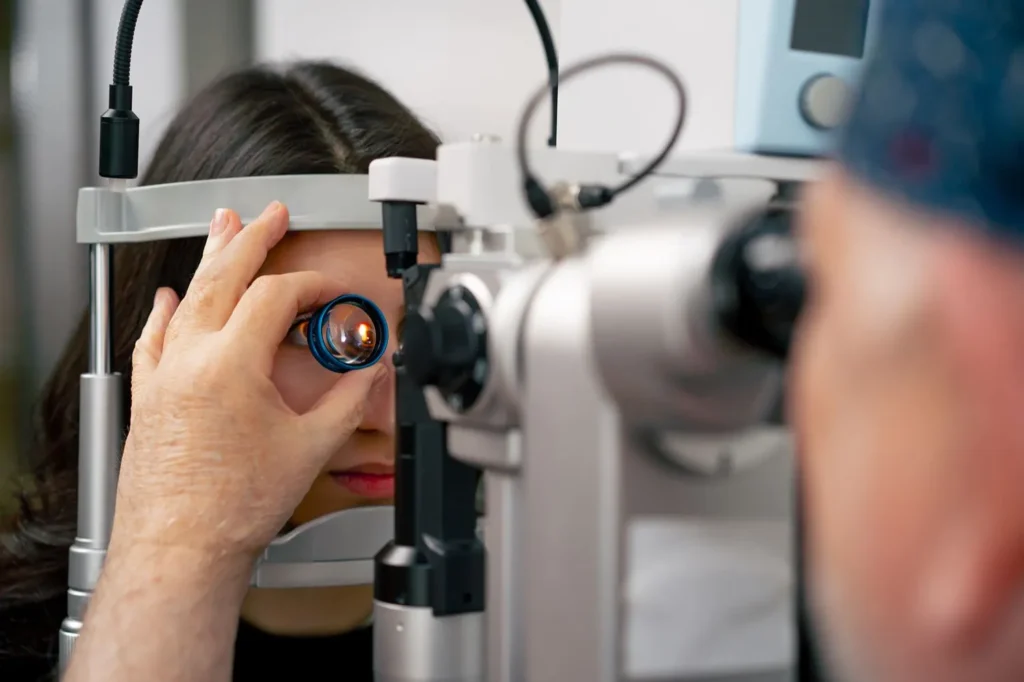
What is Vitreoretinal Surgery?
Vitreoretinal surgery involves delicate procedures performed deep inside the eye to treat diseases affecting the retina and vitreous—the gel-like substance that fills the eye. Using advanced microscopic instruments and lasers, these surgeries address a variety of complex eye conditions to preserve and improve vision.
At our Newport clinic based at St Joseph’s Hospital, Mr. Mo Majid offers expert vitreoretinal care covering a comprehensive range of treatments.
Common Conditions Treated
Mr. Majid specialises in managing an array of retinal and vitreous disorders, including but not limited to:
- Retinal detachment
- Macular hole
- Epiretinal membrane
- Vitreomacular traction
- Diabetic vitreous haemorrhage
- Proliferative diabetic retinopathy
- Floaters
- CMV retinitis
- Endophthalmitis
- Eye trauma (perforating/penetrating injuries)
Whether your condition is urgent or chronic, Mr. Majid’s expertise ensures you receive the most effective surgical intervention available.
Types of Vitreoretinal Surgery Offered in Newport
At our Newport clinic, we provide several advanced vitreoretinal procedures, tailored to your specific diagnosis, including:
- Pars plana vitrectomy (removal of vitreous gel)
- Membrane peeling (for epiretinal membranes or macular holes)
- Laser retinopexy (to seal retinal tears)
- Intravitreal injections combined with surgery
These minimally invasive techniques enable precise repair of retinal damage with rapid recovery and excellent outcomes.
Why Choose Us for Surgical Retina Care in Newport?
Choosing the right surgeon and facility for retinal surgery is crucial. At St Joseph’s Hospital Newport, you’ll receive consultant-led care from Mr. Mo Majid — a highly experienced Senior Consultant Ophthalmologist with over 25 years of specialised vitreoretinal expertise.
Key Reasons to Choose Our Clinic in Newport:
Expert surgeon: Over 25 years of vitreoretinal surgical experience
State-of-the-art operating theatre technology and advanced imaging tools
Fast access to appointments and seamless care coordination
Personalised, consultant-delivered treatment plans
High surgical success rates with compassionate patient support
Whether you need surgery for retinal detachment, macular holes, diabetic vitreous haemorrhages, or other complex conditions, our Newport clinic provides world-class retinal care without the long NHS delays.
What to Expect During Surgical Retina Treatment in Newport
Surgical retina procedures — such as vitrectomy or membrane peel surgery — are highly specialised techniques used to treat complex and often urgent retinal problems. While your treatment is personalised to your condition, here’s an overview of what a typical patient journey looks like at St Joseph’s Hospital in Newport.
Before Surgery: Getting Prepared
- A thorough retinal assessment and eye scan will be carried out using advanced imaging like OCT.
- You’ll also have a general medical review, and your medications will be discussed — some may need to be adjusted or stopped.
- Avoid eye makeup and contact lenses for at least 48 hours before your operation.
- Please don’t eat or drink for 8 hours prior to surgery, unless instructed otherwise.
- Arrange for a family member or friend to accompany you home after your procedure.
- Your surgeon, Mr. Mo Majid, will take time to walk you through the operation and obtain informed consent, answering any last-minute concerns.
On the Day: Step-by-Step Process
Step # 1
The eye is numbed and dilated, and antiseptic solution is used to clean the area.
Step # 2
A tiny incision is made in the white part of the eye (pars plana) to access the retina.
Step # 3
Microscopic instruments and a fibreoptic light are used to visualise and treat the retina.
Step # 4
Depending on your condition, Mr. Majid may:
Step # 5
The eye is then filled with a saline solution or a gas bubble to support healing.
Step # 6
Finally, antibiotic ointment is applied, and the eye is padded for protection.
After Surgery & Recovery
- Most patients are discharged on the same day, but you must not drive — ensure someone is available to take you home.
- You’ll receive a detailed aftercare plan, including prescribed eye drops and any necessary head-positioning techniques (if a gas bubble was used).
- Recovery timelines vary, but gradual improvement in vision is expected over the following weeks.
- Follow-up appointments in Newport will be arranged with Mr. Majid to assess healing, vision progress, and address any concerns along the way.
World-Class Technology in Newport

Our Newport surgical retina service utilises the latest high-resolution imaging, including Optical Coherence Tomography (OCT) and fluorescein angiography, for accurate diagnosis and treatment planning.
The operating theatres at St Joseph’s Hospital feature cutting-edge vitrectomy machines, laser systems, and microscopic visualization tools that enable Mr. Majid to perform complex retinal surgeries with precision and safety.
This combination of expert skill and advanced technology ensures personalised, effective care without needing to travel far from home.

Meet Your Surgeon in Newport
Senior Consultant Ophthalmologist | Leading Vitreoretinal & Cataract Surgeon
Mr. Mo Majid brings over 25 years of expertise in managing complex retinal conditions through both medical and surgical treatments. Internationally recognised for training more than 50 senior ophthalmologists worldwide, he also holds a distinguished PhD from the University of Bristol focused on macular degeneration.
Expert Surgical Retina Care at St Joseph’s Hospital
At St Joseph’s Hospital Newport, Mr. Majid combines advanced surgical skill with a compassionate, patient-centred approach. Patients benefit from consultant-led care delivered in a modern private hospital setting, with access to the latest imaging and operating theatre technology.
Qualifications & Recognition
Over 25 years of consultant-level experience in vitreoretinal surgery
International trainer of over 50 consultant ophthalmologists
PhD in macular degeneration research from the University of Bristol
Extensive contributions to peer-reviewed medical research
Academic & Professional Achievements
The Royal College of Ophthalmologists
The American Society of Retina Specialists (ASRS)
The American Academy of Ophthalmology (AAO)
The Association for Research in Vision and Ophthalmology (ARVO)
Your Trusted Eye Surgeon
With his precision-led approach, commitment to safety, and compassionate care, Mr. Majid delivers outstanding outcomes for patients in South Wales — ensuring world-class retinal treatment without the long NHS delays.
Our Newport Clinic
St Joseph’s Hospital, Newport
- St Joseph’s Hospital Harding Avenue, Malpas Newport, NP20 6ZE
- Mon-Sat: 9AM to 5PM
Aftercare & Recovery
Following vitreoretinal surgery, dedicated aftercare plays a crucial role in your recovery and long-term visual outcome. At St Joseph’s Hospital in Newport, Mr. Mo Majid and his experienced team provide detailed post-op guidance and personalised follow-up to support your healing every step of the way.

What to Expect After Surgery:
- You’ll be asked to wear an eye shield at night for several days to prevent accidental rubbing or pressure on the eye during sleep.
- A course of antibiotic and anti-inflammatory eye drops will be prescribed to reduce swelling and guard against infection.
- For the first week, avoid dusty or polluted environments and refrain from using eye makeup, which could irritate the eye.
- Activities like swimming, contact sports, or bathing in tubs should be avoided during the initial recovery phase to minimise the risk of complications.
- Driving is not advised until you’ve had a follow-up review and been medically cleared.
- Heavy lifting or intense physical exertion should be paused for at least a week after surgery.
If you notice any concerning symptoms — such as eye pain, excessive redness, discharge, or sudden vision changes — contact our Newport team immediately for guidance.
Recovery Timeline:
- Most patients experience a recovery window of 4 to 6 weeks, during which vision gradually stabilises.
- You’ll return to our Newport clinic for scheduled follow-ups, allowing Mr. Majid to monitor your healing progress and respond quickly to any issues.
Risks and Complications:
Although vitreoretinal surgery is highly advanced and generally well tolerated, as with any surgical procedure, some risks remain. These may include:
- Raised pressure within the eye (ocular hypertension)
- Swelling of the cornea (corneal oedema)
- Residual bleeding within the eye
- Eye infection
- Retinal detachment
With expert oversight from Mr. Majid and close monitoring at our Newport clinic, complications are rare and typically managed swiftly when identified early.
for the quickest response please use WhatsApp
Book an Appointment
Local FAQs — Surgical Retina in Newport
What retinal surgeries can I have at St Joseph’s Hospital Newport?
We offer a comprehensive range of vitreoretinal surgeries including vitrectomy, membrane peeling, laser repair, and treatment of retinal detachments and diabetic eye complications.
How quickly can I get assessed for surgical retina treatment in Newport?
Urgent cases are prioritised, with many patients seen within days. Surgical scheduling follows promptly once the treatment plan is confirmed.
What technologies support retinal surgery at your Newport clinic?
Our operating theatre is equipped with advanced vitrectomy machines, laser systems, and microscopic imaging to ensure precise and safe surgical outcomes.
Do you provide post-surgical follow-up at the Newport clinic?
Yes. All postoperative reviews and ongoing monitoring can be done at St Joseph’s Hospital in Newport. This ensures your recovery is closely supervised in a convenient, local setting — with rapid access back to your consultant if needed.







